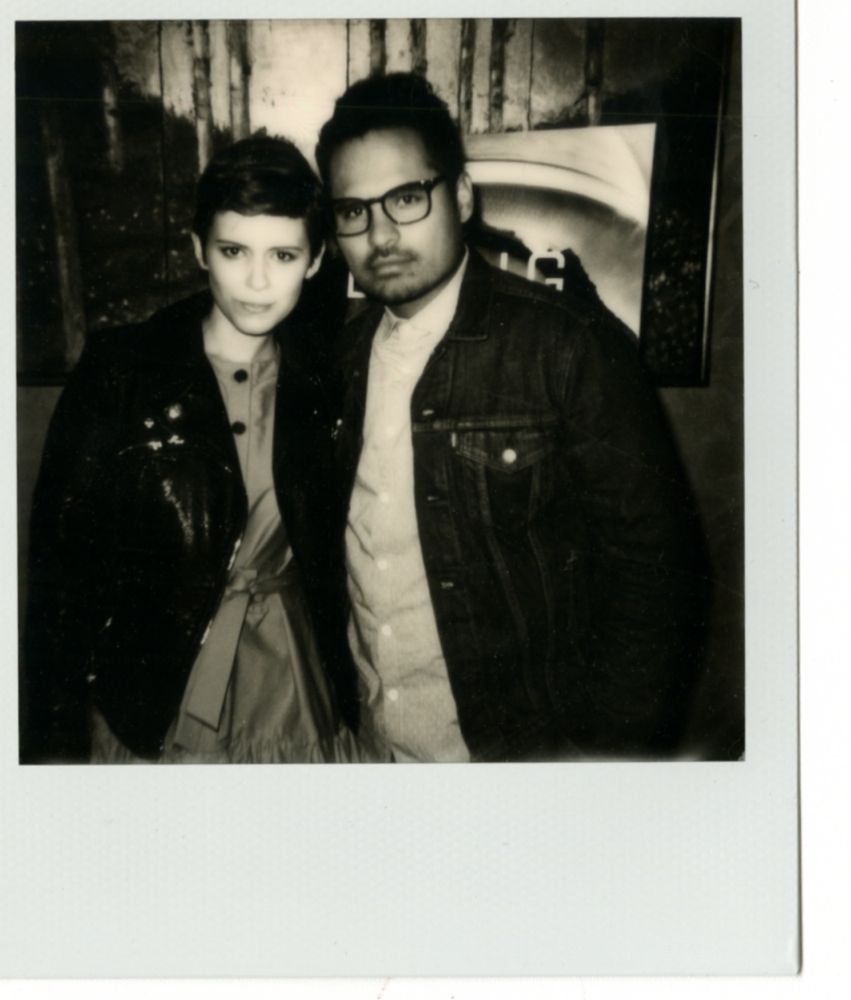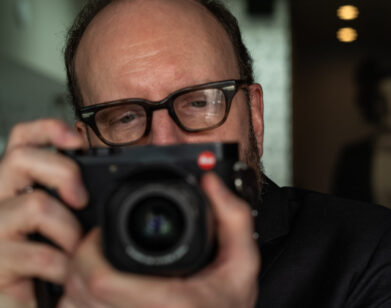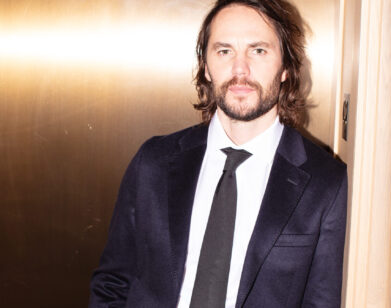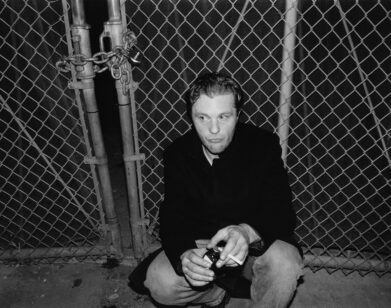After Life on Mars
Andy Weir’s debut novel The Martian (Broadway Books) begins with a simple “I’m fucked.” American astronaut Mark Watney is left for dead on Mars. His crew has departed for Earth; he has no way to communicate with anyone. He has some supplies, but definitely not enough to last him until the next NASA mission arrives. He is not exaggerating.
Now a film directed by Ridley Scott, The Martian should be a depressing tale—a grueling two hours of a man descending into madness as he gradually withers away—but it’s not. Instead, Weir’s story is a celebration of humanity: our humor and our ability to think, create, and care for one another.
Tomorrow, The Martian, which remains faithful to Weir’s novel, will open across the U.S. The cast is filled with famous names: Matt Damon plays Watney, with Kate Mara, Jessica Chastain, Michael Peña, Sebastian Stan, and Aksel Hennie as his crew-mates. Chiwetel Ejiofor, Mackenzie Davis, Kristen Wiig, Jeff Daniels, and Donald Glover make up some of the crew’s support team on Earth.
We spoke with Mara, Peña, and Weir at the Toronto Film Festival last month. To read Mara and Peña’s interview, continue below, but to skip to Weir’s interview, click here.
Kate Mara and Michael Peña
EMMA BROWN: Do you consider yourselves optimists?
KATE MARA: I’m a realist.
MICHAEL PEÑA: Optimist is a loaded question. I guess I’m more of a realist because you know that eventually something’s going to go wrong, but you just try for the best. It depends on energy.
MARA: I’m more optimistic than pessimistic.
BROWN: Do you think that the crew did the right thing leaving Mark behind?
MARA: We thought he was dead.
PEÑA: I think so because all signs pointed to him being dead. If someone sees this movie and they see what happens to him, they’re like, “Oh, that guy’s dead.” But his face is the poster so it’s like, “Okay, he’s not going to die.”
MARA: As astronauts, you all have someone that you have to answer to. Even if one of the characters wouldn’t have left him behind and would have stayed, we have to follow our orders; that’s the job.
BROWN: Had you met everyone involved with the film before you signed on?
PEÑA: I’ve known her for 10 years.
MARA: We’ve known each other forever. I signed onto it and then two days later I heard that Mike was probably doing it too. I texted him and was like, “You have to do this!” So that was exciting. Everyone else was new for me.
PEÑA: I just wanted to work with Ridley.
MARA: Me too.
BROWN: How did you first hear about the film? Did Ridley approach you?
MARA: I got a call asking to meet with Ridley and we sat down together. They hadn’t given me a script yet or anything like that, and I hadn’t read the book yet. I wanted to do it immediately. Like Mike, I wanted to work with Ridley forever. After our meeting I knew that that was definitely still true. Then I read the script and I read the book right after that. I just became more and more excited.
PEÑA: I got a call, which is one of those crazy calls: “Oh, Ridley Scott wants to meet you.” You’re like, “What…really?” I read the script first because the meeting was in three weeks or something like that. The part was important, but it wasn’t one of the leads, but you’re like, “I don’t care. Why even have the meeting? Just tell him that I want to do it.” And then I was like, “No wait. I want to meet him.” At the initial meeting he had almost all of his prep-work done. He showed me the places he was going to shoot in Jordan and the different types of dirt there are in Jordan that are the most like Mars. Then he was just talking to me about the character and I said, “Okay, thank you.”
BROWN: Did he ever say, “I thought of you because of I saw you in X project”?
MARA: No, but Ridley does his homework. He watches everything that the actor he is interested in has done. He told me that he was a fan of House of Cards.
BROWN: Is that embarrassing? “I can’t believe you saw that film”?
MARA: I think he’s probably smart about what he chooses to watch.
PEÑA: I don’t think he saw my episode of Moesha.
BROWN: What makes Ridley a good director to work with on set?
PEÑA: For me, what he does is that he sets up the surrounding aspects that inform you of what you’re going to do. He doesn’t even really block very much.
MARA: No, because he wants you to be free to do what you feel you should be doing. That’s one of the reasons the four cameras —at times five or six—is so convenient for actors. You can go wherever you want and you can overlap each other’s dialogue and all those things that feel natural.
PEÑA: Every set has its own pressure. There’s always a sense of nervousness; you can take it down from the EP that’s trying to make the day, the director, the shots, some people are really just trying to keep their jobs. And Ridley’s great at defusing everything. I get nervous because I just want to make sure that I’m memorizing dialogue. That’s something I’ve had since I was a kid and started acting. With Ridley, it’s a little bit different; he can just let you go. If you mess up, you can find your way back in, which is more like life anyway: “What am I trying to communicate? What am I trying to do?” He doesn’t like it perfect like a sitcom. In a sitcom, it’s really important to have the delivery of a certain line [right], here he just wants life. So he provides that stage.
BROWN: Does he do a lot of takes?
MARA: No.
PEÑA: Which is odd because it’s such a technical movie. The one time he did do a handful of takes was when there was a sweeping shot, or something very, very specific that’s more visual.
MARA: I think he’s already perfected what the technical aspects of it are. By the time the actors step on set, he knows exactly what the shots will be and he doesn’t have to rehearse that bit with us, so it’s very quick.
PEÑA: A couple of times, because there’s no rehearsal, I didn’t know we were filming.
MARA: They’ll say, “We’re moving on” and we go, “Wait—”
PEÑA: “Did we do this?” “Yeah, that’s it.” “Okay, good.” It lets you improv too, which is really interesting. I didn’t go crazy about it, but there are a couple of lines in there that I thought would be good to put in and they kept them.
MARA: When you go, “in English please.” That was you.
PEÑA: Had a little chuckle. That’s all you can ask for.
MARA: You always make me laugh. There are bits in the movie where I can’t remember if it’s you or your character.
PEÑA: You make me laugh because you’re always smiling. I sometimes can’t tell, are you laughing at me or smiling with me?
MARA: Sometimes both.
BROWN: Are you the most like Mark, Michael?
PEÑA: I don’t know. Kate graduated early from high school; I didn’t go to college. I was a nerd. It almost feels like it’s double-sided. My father’s a very serious, very stoic kind of Mexican—whatever you think that Mexican dude is, that’s my dad. Then my mom on the other hand was this really cute, little chubby girl, but the funniest most charismatic person I’ve ever met. She’s not with us anymore. I feel like I take a lot from my mom. Especially growing up in the ghetto, she made life so much better; it was so much more fun. I feel like I take different parts from both, but when I get around her for some reason I always act like an ass.
MARA: [laughs] I bring out the ass in him.
BROWN: When you first met, did you become friends right away?
PEÑA: Pretty instantly.
MARA: Yeah. We worked on Shooter together. It was like we knew each other. You know how you have that with some people? It’s just easy.
PEÑA: We had a really good relationship with Aksel Hennie, Sebastian Stan, and Jessica Chastain [on The Martian]. It was an easy mold.
MARA: There was not that one person who was, “Oh, that didn’t really work.” Everyone had a very specific personality in the group. We would all have dinners and stuff after work.
PEÑA: I remember at Fury, we had to work at that. You had so many egos. Everyone was sort of in character at the same time, and it was perfect for that, but—
MARA: The tension was probably good for that, but for us, the ease was good.
PEÑA: Exactly, you didn’t want that. Sometimes it just falls into place like in this movie.
BROWN: When you do a film that’s based on a book, do you find it helpful to read the book, or is it more everything you need to know is in the script?
MARA: Not necessarily, it depends.
PEÑA: You like doing it though, you read the books.
MARA: With House of Cards, it was another series that we were basing it off of. I was told that it would be silly for me to watch that because we were making a totally different version of it. For this is I did because I was excited about it. I heard how amazing it was and like Mike said, our characters are important to the story, but were not in it a massive amount. So I was curious to see what kind of information I would learn about my character from reading the book. There was a lot. There was a lot more in there about backstory and my relationship with each crew member. I used that, definitely. That helps form a character.
PEÑA: I don’t read source material very much. I remember we were doing Shooter, that’s where I started reading the book and it kind of messed me up a little bit. It gave me too many choices of what I could do. The tone was slightly different and the ideas that I got from the script were different from the ideas that I was getting from the book. I tried to mesh both and it didn’t work out.
Andy Weir
EMMA BROWN: I heard that you were hired as a programmer when you were 15.
ANDY WEIR: Yes, for Sandia Labs in Livermore. To be fair, I wasn’t actually hired to be a programmer; I was hired to be a lab assistant. They were hiring high school students from town. The lab I ended up at said, “We don’t really need a test tube cleaner, but we do need someone to figure out how to write a computer program to analyze data for us.” Nowadays, you would just take that data set, bring it into Excel, do a macro and you’d be done. Back then, none of that existed. They said, “We need you to learn how to program computers. There’s a computer, here’s a book on how to program computers, go do that.” I spent a few weeks figuring that out and then I came back and said, “I think I know how to do it.” That began a 25-year career in computer programming.
BROWN: Were you interested in computers before then?
WEIR: Yeah. I’m a science dork and a nerd. It turned out to be something I really enjoyed. When people tell stories about how they got into their careers it always makes it sound like, “Oh, the world conspired to bring you into this.” I did all sorts of stuff when I was young, I liked playing music, I had all sorts of interests. Computers were one of them and that ended up being a really good career to have right at that time.
BROWN: When did you start working full-time?
WEIR: I would do it part-time while I was in high school and full-time over the summers. But probably not until I was 22, when I finished college.
BROWN: Do you have a degree in computer science?
WEIR: I do not. I ran out of money, so I couldn’t finish college. When I left college it was about 1994, programmers were in huge, heavy demand. They didn’t care if you had a degree or not. I could either go deeply into debt and finish college, or I could go get a job and people would pay me. So that’s what I did. I kind of regret not finishing what I started. It never impacted my career. Only the first couple of jobs ever cared; beyond that everyone cared about experience.
BROWN: When you started writing The Martian, did you ever consider sending it to a publisher?
WEIR: No. I started writing this around 2009 and it took me about three years. I was posting it to my website. I never considered sending it a publisher because earlier in life, I tried to break into being a novelist and I got slapped down so hard I gave up on it. In my late 20s, I got laid off from AOL and I had a bunch of money from a good severance package and a bunch of stock options. I was like, “I’ve got enough money to take a few years off and not work at all. I’ll take my shot, I’m going to become a writer.” I wrote a book—it was not The Martian, it was a previous effort—and I couldn’t get an agent, I couldn’t get a publisher. It’s sort of the standard tale of woe that you hear from every author. I figured, “I tried. Now I’m going to go back into computer programming,” which wasn’t a huge defeat for me because I really like computer programming. Then I just started writing as a hobby. By the time I wrote The Martian, for me writing was firmly a hobby.
BROWN: Did you get good feedback when you posted new chapters of The Martian on your website?
WEIR: Yeah, some. I had a very small reader base. At its peak, it was about 3,000 people. They turned out to be invaluable because they’re all science dorks like me, so when I was writing The Martian they would double check all my math.
BROWN: At the end of the book, you have a note about how you corrected some of the science before releasing it with Random House. What were some of the things you got wrong?
WEIR: There are a couple of things in the book that are deliberately wrong and then there are a few things that are accidentally wrong. Deliberately wrong is the sandstorm at the beginning. That can’t happen. Mars’s atmosphere is about half a percent of what Earth’s atmospheric density is; it’s almost a vacuum. It’s very close. It does get 150 km/hour winds, but because the density’s so low, the force hitting you would feel like a one kilometer breeze on Earth. It wouldn’t damage anything. That’s a concession I made for drama. It was a man versus nature story and I wanted nature to get the first punch in. That was deliberate. I did hand-wavy, made up technology to explain why he doesn’t get radiation problems. When you’re on Mars you’re getting hit by a lot of radiation that we’re protected from on Earth because of our magnetosphere and our atmosphere—there’s no technology that’s thin and light and can block radiation. Those are some deliberate concessions. Some accidents in the book were I did some of the chemistry wrong for reducing hydrazine; I got the quantities wrong. A lot of my math is off on that stuff.
Since The Martian has been released, new technology and new information about Mars has come to light that has invalidated some of the things in The Martian. For instance, one big thing in the book is that he has to use these disposable CO2 canisters, which absorb the carbon dioxide out of the air so that it won’t poison him. Modern NASA EVA suits, their PLSS—the Portable Life Support System backpack part of the space suit—they can just pull carbon dioxide out of the air without any problem, they don’t need filters; they can do it indefinitely. The other thing is, in the book and in the movie, Mark has to do a whole bunch of stuff to create water—it’s this big complicated mess. Well, Curiosity, the probe, went to Mars, picked up some dirt, and said, “There’s a shit load of water in here.” It turns out that for every cubic meter of Martian soil there’s about 35 liters of water trapped in it as ice. So all Mark had to do was bring a bunch of dirt inside and heat it up. Oh well.
BROWN: You’ve mentioned in the past that you received lots of letters about The Martian. What was your favorite?
WEIR: I got feedback from Larry Niven, who was one of the authors I read growing up, so that was amazing. Buzz Aldrin—I got to hang out with him a bunch too. Although probably the most exciting for me was one of the earliest things. I had just self-pubbed, we had the print deal in place but it had not yet come out, and I got fan mail from the mission control center in Houston. They were sitting around waiting for an EVA and the had six hours to kill. They basically had nothing to do, they were just talking to each other and the conversation turned to The Martian, which most of them had read. I thought that was really cool.
BROWN: Lastly, I wanted to talk to you about optimism. Are you an optimist?
WEIR: I’m not sure if I’m an optimist or everybody else became a pessimist while I wasn’t looking. What people see as me being optimistic is backed up by an endless array of data. Human beings are inherently cooperative. We’re good, usually. The bad ones are the ones you hear about, but the reason you hear about them is because they are so anomalous. Also I have optimism that the future is always better than the past, just as a rule. A lot of science fiction has these dystopian, nightmare worlds—an oppressive central government suppressing the people and the impoverished class, the serfs. But let me ask you this: It’s 2015, you can go back to any XX15 you want and spend the rest of your life there. We’ll set you up; we’ll establish you with a life and an identity and some starting money. Which one would you want to go to? I’d want to stay here.
THE MARTIAN IS OUT TOMORROW, OCTOBER 2, ACROSS THE U.S.







